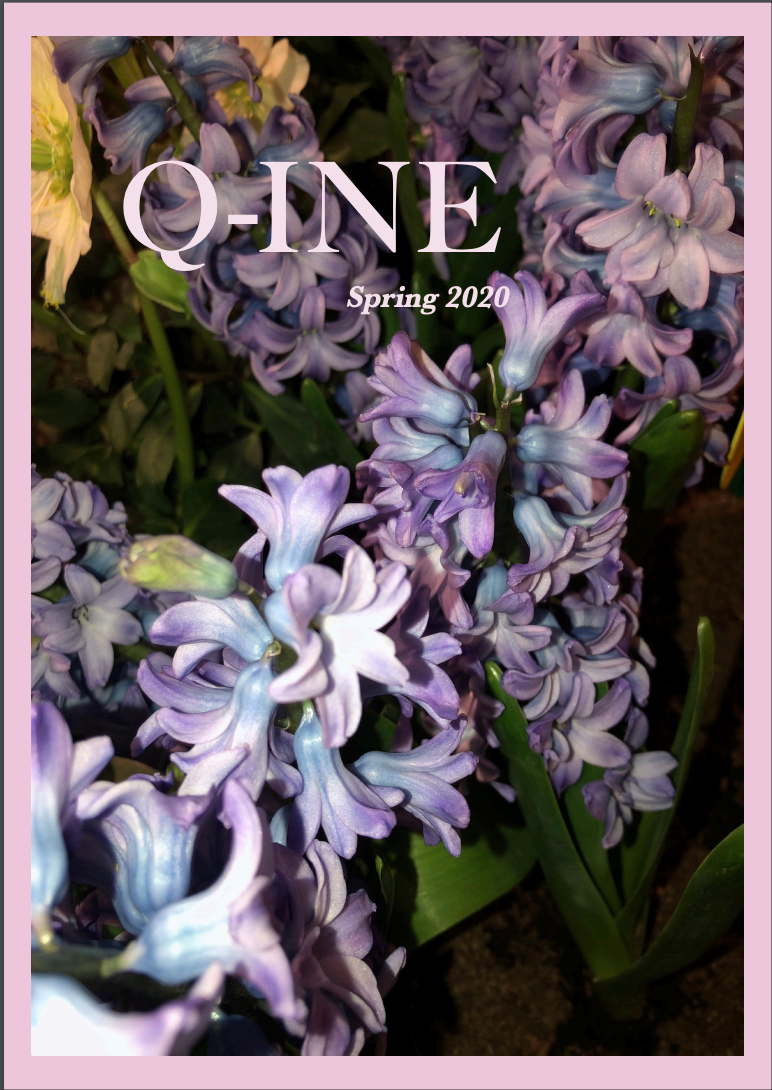
Liam Forsythe C’21 and Ana Acevedo C’21, two science majors who met in a pre-med fraternity at Penn, knew nothing about running a magazine. But that didn’t stop them from giving it a shot. And even without any prior experience—and in the midst of a global pandemic—they made it happen. After nearly a year of work, Q-INE magazine debuted on June 1, the first day of Pride Month.
Pronounced “queen,” the LGBTQ-interest publication serves up poetry, prose and visual art from across the Penn community. “We see this magazine as a unifying force for all the experiences people have on campus,” Acevedo says. In addition to current students, alumni, faculty and staff, she’s hoping the publication also reaches those who are considering applying to Penn or have recently been accepted. “We want them to see what their life could be like, what the community looks like here,” she says.
“It’s also about being able to share these experiences and see that they are universal,” Forsythe says of the stories and sentiments woven throughout Q-INE. “Even if you’re someone who’s not part of the LGBT community at Penn, you could get something out of this—whether it’s learning about different experiences from your own or seeing how similar your own experiences may be.”
The inaugural issue includes an essay titled “Maybe You Can Call Me They?,” about how the author came out as queer and has struggled with people misgendering them ever since. “I would be lying if I said that I felt no sadness and rage over the many years I spent not knowing how to name, not knowing whether or how to claim my identity, not knowing much else other than my confusion,” they write.
In the photo essay “Philadelphia 31 Oct 2019,” Luca Fontes shares snaps of himself in various costumes. In some he’s wearing pants and suspenders; in others, skirts and stockings. “As a bisexual man, I am often faced with the decision of how I want to present myself,” he writes in the accompanying text. “Appearing more masculine, more feminine, more queer, or more conventionally straight become decisions that change daily.” But Halloween, he writes, “allows for a gender-bending expression of self through the act of dressing up in costumes.”
Forsythe says one of his favorite pieces in the issue, a poem titled “It’s The Day Before Valentine’s 2019,” is also one of the most universally relatable. Written by Erin Jin Mei O’Malley and Sudeep Bhargava, it includes these lines:
It’s now 2020, another february later and what’s changed?
I said I wanted love, but here / I am again tonight, the same house
party breaking my body / out into a thousand flashbacks,
each one as faceless / as a dance floor wrecked
by sweat, each one an epithet / the tall one / the one
with the glasses / the straight one / the one
who could have been—each one a synonym for sorry, though I don’t
know where my mouth begins and the apology ends.
“While it’s about queer relations, many students can identify with a lot of those feelings,” he says.
Forsythe and Acevedo both came to the idea of creating an LGBTQ publication independently, but based on the same experience: a launch party for the Spring 2019 issue of La Vida, Penn’s Latinx-interest magazine. They both stopped by the party to support their friends—and each realized the need for a similar outlet in the LGBTQ community, Acevedo says.
When they were chatting soon after the party, “it came up that we both had thought about this idea,” Acevedo says. And last summer, they decided to go for it.
They connected with staff from Penn’s LGBT Center and the Kelly Writers House early on. Both hubs offered advice, supplied contacts who could help them learn the ropes, and provided enough seed money to cover Q-INE’s first issue.
They put out calls for submissions—through posted fliers, through campus listserves and newsletters, and by asking friends and friends of friends. Acevedo says they purposely kept their requests for submissions “very general.” “We wanted people to express themselves and their identity and whatever experiences they had on campus,” she says.
They assembled a Q-INE editorial board with six more students who helped cull submissions, edit pieces, and design the magazine. The first issue is available in full online, but Acevedo and Forsythe are still hoping to produce print copies once students return campus.
They’re already thinking about the next issue, too. From the outset, they planned to make Q-INE an annual publication, and they recently received a grant from The Sachs Program for Arts Innovation to help cover costs for their second issue. Funding from the Student Activities Council is also in the works, and they hope to receive that support by their third year.
Q-INE is currently accepting submissions for its 2020-21 issue. Alumni, faculty and staff—along with current students—are encouraged to submit work in any number of forms, from poetry and essays to interviews, fiction, memoir and visual art.
—Molly Petrilla C’06

